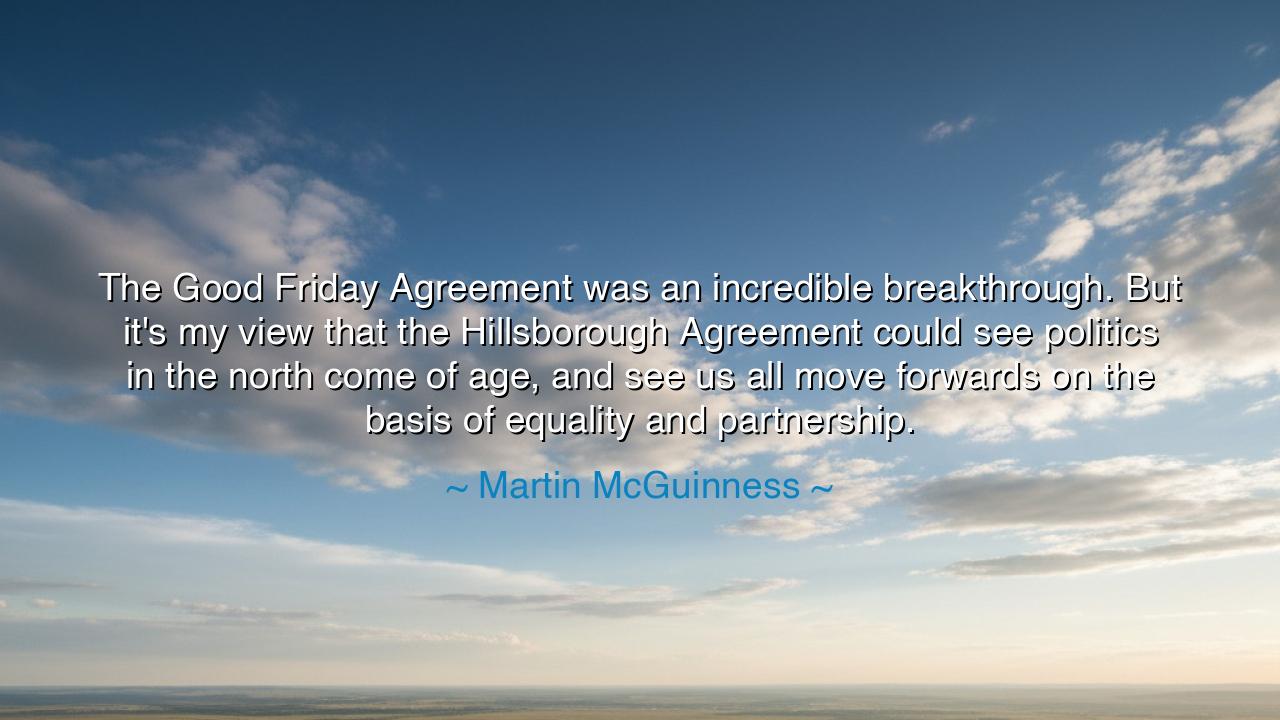
The Good Friday Agreement was an incredible breakthrough. But
The Good Friday Agreement was an incredible breakthrough. But it's my view that the Hillsborough Agreement could see politics in the north come of age, and see us all move forwards on the basis of equality and partnership.






In the words of Martin McGuinness, “The Good Friday Agreement was an incredible breakthrough. But it’s my view that the Hillsborough Agreement could see politics in the north come of age, and see us all move forwards on the basis of equality and partnership.” These words echo with the voice of a man who walked through conflict and emerged with a vision of peace. McGuinness, who once knew the harsh struggle of division, speaks here of two great milestones: one that ended centuries of bloodshed, and another that sought to guide a fractured people into maturity, trust, and shared governance. His words remind us that peace is not a single event but a journey of many stages.
The Good Friday Agreement of 1998 was indeed a miracle in its time. It brought to a close the long and bitter conflict known as the Troubles, which had scarred Northern Ireland with decades of violence, mistrust, and sorrow. It was the moment when former enemies sat together, acknowledging the futility of bloodshed and the necessity of coexistence. In ancient terms, it was the silencing of the war drums and the laying down of swords at the same table. McGuinness honors this as a breakthrough, for it gave the people the possibility of a future no longer chained to the past.
Yet he reminds us that the work of peace is never finished. The Hillsborough Agreement of 2010 was another step on this long road. While Good Friday planted the seed, Hillsborough sought to cultivate it—bringing stability to power-sharing, transferring authority over justice and policing, and strengthening the fragile institutions of democracy. McGuinness speaks of this as the moment politics might “come of age,” for true peace is not merely the absence of war, but the presence of mature governance, equality, and mutual respect. It is the moment when a people cease to define themselves by wounds and instead build together as partners.
History offers us parallels. Consider the tale of the Greek city-states, long divided by rivalry and bloodshed. Their wars weakened them until foreign powers conquered them. But when, on rare occasions, they formed alliances, they flourished in culture, philosophy, and strength. McGuinness understood this ancient truth: without partnership, victory is hollow, and without equality, peace is brittle. Only when former adversaries become partners can a society truly move forward.
The heart of McGuinness’s words lies in equality. For centuries, Northern Ireland was plagued by inequality—Catholics and Protestants, nationalists and unionists, each feeling excluded, each harboring grievances that turned to violence. To move forward “on the basis of equality” is to recognize that no child, no family, no community is worth less than another. Equality is the foundation upon which trust is built, and without it, politics remains a struggle for dominance rather than a covenant of cooperation.
The second pillar he names is partnership. Partnership is more than tolerance; it is shared labor, shared burden, and shared destiny. It is the recognition that in order to survive, a people must not only live side by side but work hand in hand. This is the maturity McGuinness envisioned—a politics not of enemies forced into truce, but of partners building together. It is the same lesson the ancients taught: the strongest societies are those in which differences are woven into harmony, like many threads forming one unbreakable cloth.
The lesson for us, then, is clear: peace is not a single triumph but a continual labor. Each generation must renew the covenant of equality and partnership, or else risk returning to division. We must not look upon agreements like Good Friday and Hillsborough as finished monuments, but as living seeds that must be watered with trust, compromise, and vision. The work is never done, but the rewards are immeasurable: a society that has “come of age,” where children inherit not bitterness but hope.
Practical actions follow from this wisdom. Build equality in every sphere—in law, in education, in opportunity—so that no group feels forgotten. Practice partnership daily, not only in politics but in communities and homes, by listening, compromising, and honoring difference. Guard the peace as a fragile treasure, remembering that it is easier to destroy than to build. And above all, choose to move forward together, knowing that the destiny of a people is not found in victory over one another, but in the shared triumph of unity.
Thus, McGuinness’s words stand as both tribute and challenge. They honor the Good Friday Agreement as the miracle of its time, but they charge us to see the Hillsborough Agreement as the step toward true maturity. Let us then carry this wisdom forward: that peace is more than survival—it is equality lived, partnership embraced, and a society rising, at last, to its full height.






AAdministratorAdministrator
Welcome, honored guests. Please leave a comment, we will respond soon